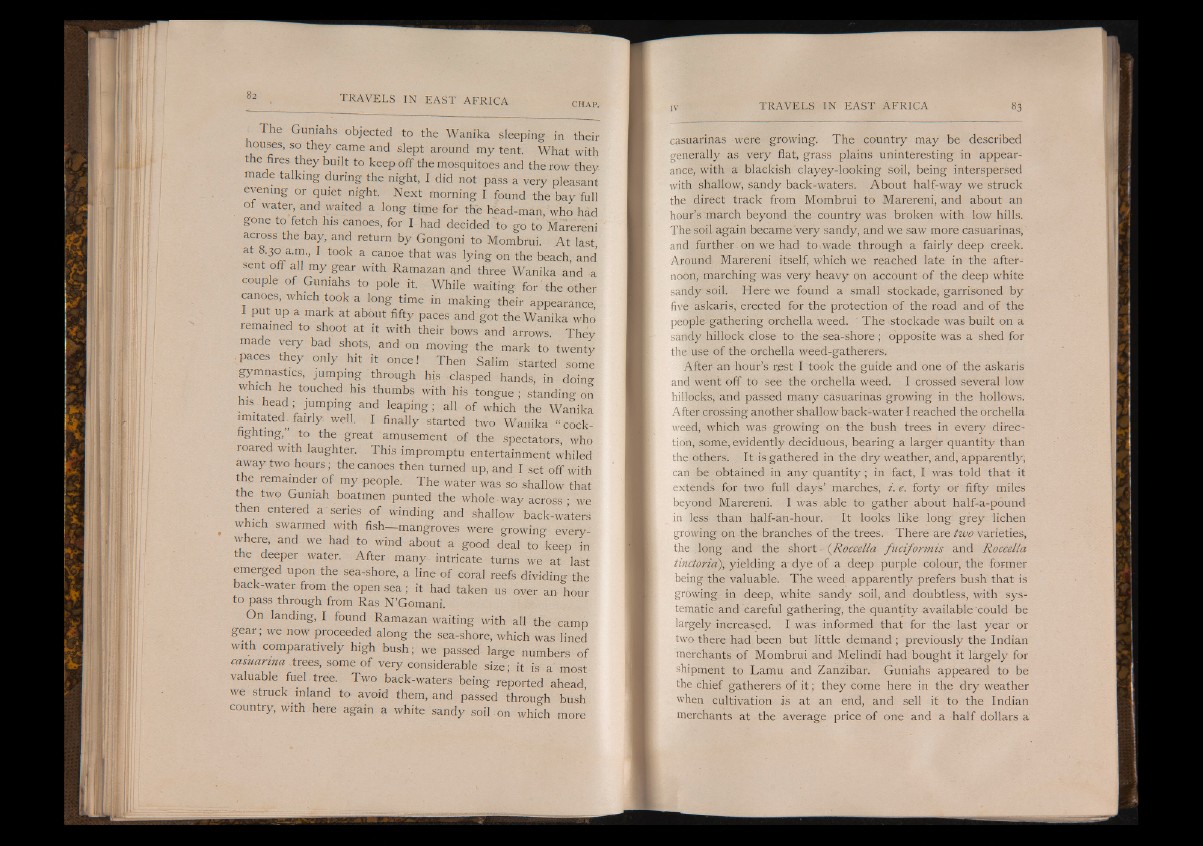
CHAP.
f The Guniahs objected to the Wanika sleeping in their
ouses, so they came and slept around my tent. What with
the fires they built to keep off the mosquitoes and the row they
made talking during the night, I did not pass a very pleasant
evening or quiet night. Next morning I found the bay full
of water, and waited a long time for the head-man, who had
gone to fetch his canoes, for I had decided to go to Marereni
across the bay, and return by Gongoni to Mombrui. A t last,
at 8.30 a.m., I took a canoe that was lying on the beach, and
sent off all my gear with Ramazan and three Wanika and a
couple of Guniahs to pole it. While waiting for the other
canoes, which took a long time in making their appearance
put up a mark at about fifty paces and. got the Wanika who
remained to shoot at it with their bows and arrows. They
made very bad shots, and on moving the mark to twenty
■ paces they only hit it once! Then Salim started some
gymnastics, jumping through his clasped hands, in doin-
which he touched his thumbs with his tongue ; standing on
his head; jumping and leaping; all of which the Wanika
imitated fairly well. I finally started two Wanika “ cock-
fighting,” to the great amusement of the spectators, who
roared with laughter. This impromptu entertainment whiled
away two hours; the canoes then turned up, and I set off with
the remainder of my people. The water was so shallow that
the two Guniah boatmen punted the whole way across ; we
then entered a'series of winding and shallow back-waters
which swarmed with fish— mangroves were growing everywhere,
and we had to wind about a good deal to keep in
the deeper water. After many intricate turns we at last
emerged upon the sea-shore, a line of coral reefs dividing the
back-water from the open sea; it had taken us over an hour
to pass through from Ras N’Gomani.
On landing, I found Ramazan waiting with all the camp
gear; we now proceeded along the sea-shore, which was lined
with comparatively high bush; we passed large numbers of
casuarma trees, some of very considerable size; it is a most
valuable fuel tree. Two back-waters being reported ahead,
we struck inland to avoid them, and passed through bush
country, with here again a white sandy soil on which more
IV TRAVELS IN EAST AFRICA 83
casuarinas were growing. The country may be described
generally as very flat, grass plains uninteresting in appearance,
with a blackish clayey-looking soil, being interspersed
with shallow, sandy back-waters. About half-way we struck
the direct track from Mombrui to Marereni, and about an
hour’s march beyond the country was broken with low hills.
The soil again became very sandy, and we saw more casuarinas,
and further on we had to wade through a fairly deep creek.
Around Marereni itself, which we reached late in the afternoon,
marching was very heavy on account of the deep white
sandy soil. Here we found a small stockade, garrisoned by
five askaris, erected for the protection of the road and of the
people- gathering orchella weed. The stockade was built on a
sandy hillock close to the sea-shore; opposite was a shed for
the use of the orchella weed-gatherers.
After an hour’s rgst I took the guide and one of the askaris
and went off to see the orchella weed. I crossed several low
hillocks, and passed many casuarinas growing in the hollows.
After crossing another shallow back-water I reached the orchella
weed, which was growing on the bush trees in every direction,
some, evidently deciduous, bearing a larger quantity than
the others. It is gathered in the dry weather, and, apparently;
can be obtained in any quantity; in fact, I was told that it
extends for two full days’ marches, i. e. forty of fifty miles
beyond Marereni. I was able to gather about half-a-pound
in less than half-an-hour. It looks like long grey lichen
growing on the branches of the trees, I There are two varieties,
the ;long and the short - (Roccella fuciformis and Roccella
tinctoria), yielding a dye of a deep purple colour, the former
being the valuable. The weed apparently prefers bush that is
growing in deep, white sandy soil, and doubtless, with systematic
and careful gathering, the quantity available could be
largely increased. I was informed that for the last year or
two there had been but little demand ; previously the Indian
merchants of Mombrui and Melindi had bought it largely for
shipment to Lamu and Zanzibar. Guniahs appeared to be
the chief gatherers of i t ; they come here in the dry weather
when cultivation is at an end, and sell it to the Indian
merchants at the average price of one and a half dollars a